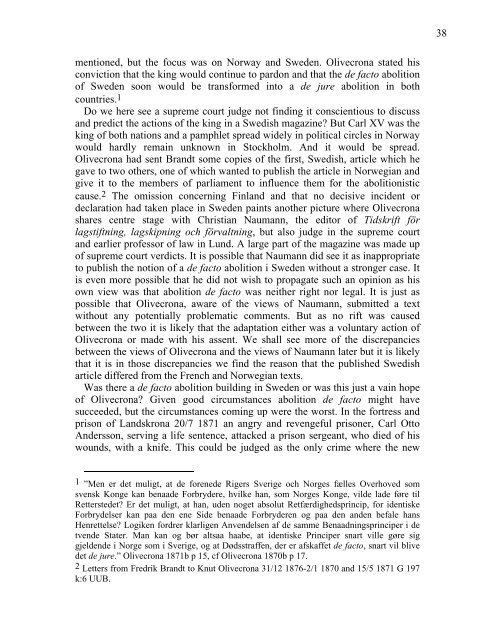Knut Olivecrona and his ”Om dödsstraffet”. - Figuras
Knut Olivecrona and his ”Om dödsstraffet”. - Figuras
Knut Olivecrona and his ”Om dödsstraffet”. - Figuras
You also want an ePaper? Increase the reach of your titles
YUMPU automatically turns print PDFs into web optimized ePapers that Google loves.
mentioned, but the focus was on Norway <strong>and</strong> Sweden. <strong>Olivecrona</strong> stated <strong>his</strong><br />
conviction that the king would continue to pardon <strong>and</strong> that the de facto abolition<br />
of Sweden soon would be transformed into a de jure abolition in both<br />
countries.1<br />
Do we here see a supreme court judge not finding it conscientious to discuss<br />
<strong>and</strong> predict the actions of the king in a Swedish magazine? But Carl XV was the<br />
king of both nations <strong>and</strong> a pamphlet spread widely in political circles in Norway<br />
would hardly remain unknown in Stockholm. And it would be spread.<br />
<strong>Olivecrona</strong> had sent Br<strong>and</strong>t some copies of the first, Swedish, article which he<br />
gave to two others, one of which wanted to publish the article in Norwegian <strong>and</strong><br />
give it to the members of parliament to influence them for the abolitionistic<br />
cause.2 The omission concerning Finl<strong>and</strong> <strong>and</strong> that no decisive incident or<br />
declaration had taken place in Sweden paints another picture where <strong>Olivecrona</strong><br />
shares centre stage with Christian Naumann, the editor of Tidskrift för<br />
lagstiftning, lagskipning och förvaltning, but also judge in the supreme court<br />
<strong>and</strong> earlier professor of law in Lund. A large part of the magazine was made up<br />
of supreme court verdicts. It is possible that Naumann did see it as inappropriate<br />
to publish the notion of a de facto abolition i Sweden without a stronger case. It<br />
is even more possible that he did not wish to propagate such an opinion as <strong>his</strong><br />
own view was that abolition de facto was neither right nor legal. It is just as<br />
possible that <strong>Olivecrona</strong>, aware of the views of Naumann, submitted a text<br />
without any potentially problematic comments. But as no rift was caused<br />
between the two it is likely that the adaptation either was a voluntary action of<br />
<strong>Olivecrona</strong> or made with <strong>his</strong> assent. We shall see more of the discrepancies<br />
between the views of <strong>Olivecrona</strong> <strong>and</strong> the views of Naumann later but it is likely<br />
that it is in those discrepancies we find the reason that the published Swedish<br />
article differed from the French <strong>and</strong> Norwegian texts.<br />
Was there a de facto abolition building in Sweden or was t<strong>his</strong> just a vain hope<br />
of <strong>Olivecrona</strong>? Given good circumstances abolition de facto might have<br />
succeeded, but the circumstances coming up were the worst. In the fortress <strong>and</strong><br />
prison of L<strong>and</strong>skrona 20/7 1871 an angry <strong>and</strong> revengeful prisoner, Carl Otto<br />
Andersson, serving a life sentence, attacked a prison sergeant, who died of <strong>his</strong><br />
wounds, with a knife. T<strong>his</strong> could be judged as the only crime where the new<br />
1 ”Men er det muligt, at de forenede Rigers Sverige och Norges fælles Overhoved som<br />
svensk Konge kan benaade Forbrydere, hvilke han, som Norges Konge, vilde lade føre til<br />
Retterstedet? Er det muligt, at han, uden noget absolut Retfærdighedsprincip, for identiske<br />
Forbrydelser kan paa den ene Side benaade Forbryderen og paa den <strong>and</strong>en befale hans<br />
Henrettelse? Logiken fordrer klarligen Anvendelsen af de samme Benaadningsprinciper i de<br />
tvende Stater. Man kan og bør altsaa haabe, at identiske Principer snart ville gøre sig<br />
gjeldende i Norge som i Sverige, og at Dødsstraffen, der er afskaffet de facto, snart vil blive<br />
det de jure.” <strong>Olivecrona</strong> 1871b p 15, cf <strong>Olivecrona</strong> 1870b p 17.<br />
2 Letters from Fredrik Br<strong>and</strong>t to <strong>Knut</strong> <strong>Olivecrona</strong> 31/12 1876-2/1 1870 <strong>and</strong> 15/5 1871 G 197<br />
k:6 UUB.<br />
38






